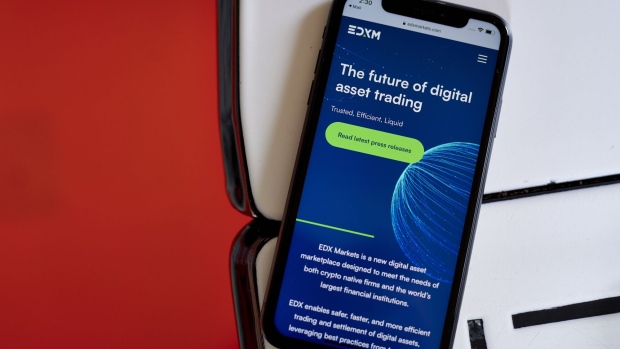Jan 23, 2024
EDX Plans Asia Crypto Exchange With Funding From Sequoia and Pantera Capital
, Bloomberg News

(Bloomberg) -- EDX Markets, the crypto-trading venue backed by Citadel Securities and Fidelity Digital Assets, is building an exchange in Singapore and expanding to offer spot and perpetual futures after securing additional financing from investors.
The company completed a second funding round co-led by new investor Pantera Capital and existing backer Sequoia Capital, according to Chief Executive Officer Jamil Nazarali. The capital will be used to build new technology and expand EDX’s presence in new markets abroad, he said, declining to disclose the exact size of the Series B funding.
“Singapore will allow us to expand our products, where we will be able to trade more tokens and perpetual futures,” Nazarali said in an interview. “Its also a great place to hire financial talent, and we want to built a proper, trusted team.”
The plans come just as the cryptocurrency market is heating up again, with increased enthusiasm from traditional finance titans thanks to the recent approval of exchange-traded funds investing directly in Bitcoin. While EDX isn’t providing crypto custody, the firm gives institutional investors a platform to buy and sell tokens including Bitcoin, Ether, and Litecoin directly, hedging their exposure to ETF products.
Read More: Bitcoin ETFs Take Wall Street by Storm With Historic Debut
To appeal to institutional investors, EDX built its own clearinghouse and outsourced the role of the custodian to avoid the potential for co-mingling of funds. It’s working with Anchorage Digital as its custodial partner. In a non-custodial model, EDX doesn’t require investors to pre-fund a trade in fiat currency or crypto for the buying and selling of cryptocurrencies. During the settlement cycle, users deposit their net obligations to an account at Anchorage, and they are able to withdraw their proceeds when settlement is concluded each day without affecting their trading limits.
Following the collapse of FTX, crypto exchanges drew criticism for failing to separate businesses including custody, market-making and trading, which can result in conflicts of interest and manipulation of funds.
“In the current crypto environment, there is a need to service institutional players with a noncustodial model for risk management, providing infrastructure to solve for complexity in liquidity and operational efficiency,” Paul Veradittakit, managing partner at Pantera Capital, said in an interview. “EDX has mimicked what institutional investors are used to in the traditional markets — speed and capital efficiency — incorporating the assets and features particular to crypto.”
Asset manager Pantera focuses on digital assets and blockchain-technology companies.
EDX’s other backers are well-known in traditional finance circles. The latest round included original backers Citadel Securities, Virtu Financial, Sequoia and the digital-asset arm of Fidelity Investments. In the latest round, investors bought in at a per-share price that was double the initial investment made in 2022, according to people with knowledge of the matter who asked not to be identified discussing information that isn’t public. Other investors in EDX include Charles Schwab Corp., GSR Markets, GTS, Hudson River Trading, Miami International Holdings Inc. and Paradigm.
Clearinghouse Launched
Hoboken, New Jersey-based EDX builds its infrastructure to mimic what exists in traditional markets outside of crypto. Last year, it launched a clearinghouse, EDX Clearing, where users pay or receive a net amount, allowing multiple counter-parties to settle a trade, avoiding the need for bilateral trading agreements. That reduces friction and the upfront capital that’s required for investors to make a trade.
EDX now has plans to build out its technology on its own and transition away from the technology it first used in partnership with MEMX, also known as Members Exchange, Nazarali said. Its future plans include the build-out of the exchange operations in Singapore, which will offer spot and perpetual futures trading, he said.
Perpetual futures, also known as perpetuals or perpetual swaps, are a type of derivative contract that allows investors to speculate on the future price of an asset such as Bitcoin without an expiration date. To start trading these products, EDX is seeking approval to operate an exchange in Singapore from the Monetary Authority of Singapore.
“Being able to provide both spot and derivatives will be a huge differentiator offshore,” said Veradittakit of Pantera. “In traditional markets, derivatives volume has been a larger market than spot and we are seeing the same in crypto, especially internationally, and this should continue to grow.”
EDX’s clients traded more than $1.4 billion in notional volume in December, and its clearinghouse has cleared more than $3.1 billion of transactions since it was launched in October, according to the company. After the Bitcoin ETFs were approved, EDX customers bought and sold more than $100 million in a single 24-hour period this month, according to Nazarali, previously global head of business development at Citadel Securities.
His firm is seeing larger Bitcoin ETFs trading at a premium to their perceived fair value and smaller ETFs trading at a discount, Nazarali said.
“There is arbitrage to be done,” he said. “But, to do that, you have to handle the physical coin.”
(Updates with Nazarali’s previous role at Citadel Securities in antepenultimate paragraph.)
©2024 Bloomberg L.P.





